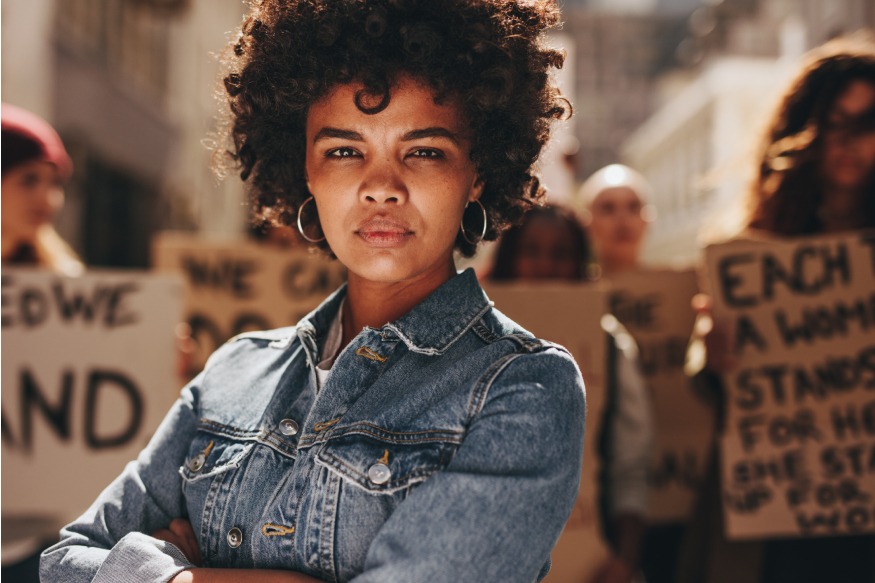
“That witch should shut up”: sexism in politics

“That witch should shut up” – just a friendly tweet a Dutch politician wrote about a political leader. Women are still often called names if they dare to stand up and speak out. Where does it come from? And how do we recognise the underlying sexism in politics and the media?
Recognising and eradicating sexism
Fewer opportunities on the labour market? Check. Unequal distribution of care responsibilities? Check. Sexism on the streets, in the workplace, and in the media? Check, check, double check.
Women are treated differently in our society, and this can be observed in many different ways. Unfortunately, we often don’t even realise it. We’re so used to it, or we’re afraid that we’ll be called names ourselves if we open our mouths.
Online sexism
The digital world is the perfect place for sexism and misogyny to prevail. Female politicians and media makers are much more likely to be the of ridicule, intimidation, and aggression than men. Women who get involved in debates also receive a ton of sexist attention. Somehow, it’s never about the content, but mainly about the fact that she’s a woman who dares to express her opinion. “I’d tap that” or “Maybe she’ll keep her mouth shut when she finally gets laid” are remarks that are never directed at men.
Of course, men are also judged by their actions. They’re corrupt, unreliable, or simply assholes. However, the hate campaigns that women face are much more vicious, spiteful, and humiliating. Basically, women should just shut up – that’s what it comes down to. That doesn’t just tell us something about the misogynistic views of these sneering commenters, but also about the way in which women with power or an opinion are still unconsciously viewed.
Click here to read more on online sexism and the effects on women in politics
Stereotypical views
Sexism impacts the way in which women get involved in the debate, or even the extent to which they want to enter the political arena at all. Certainly, huge strides have been made: we’re allowed to vote, we enjoy reproductive rights, and that glass ceiling seems more and more penetrable. However, stereotypes about women’s roles are as prevalent as ever. These underlying prejudices, which are often not very subtle, should simply be addressed if we want to improve the position of women.
It all starts with recognising the issue: the remarks, so-called “jokes”, and sexist comments that men never have to deal with.
Am I likeable?
One of the things that women in politics and the media struggle with is the sympathy factor. Case in point: when Hilary Clinton entered the presidential race in 2016, she was subjected to a great deal of verbal abuse. What her opponents targeted most was her personality. Hilary was said to be shrill, snippy, and unsympathetic – an image that stuck with her throughout the campaign.
Not surprisingly, spin doctors stick such adjectives on women as they climb to the top. After all, an “unsympathetic” woman won’t get far. Isn’t it strange that a man who continuously spews sexist crap can become president, while women with somewhat less likability can forget about their opportunities?
All eyes on her
The double standard is alive and kicking, and it affects the extent to which we see women in politics and the media. Harvard researchers found that voters look at “power-seeking” women with suspicion. Are you ambitious, and do you show it openly? Chances are your sympathy factor drops. You don’t have to be unpleasant to be unlikable; it’s more about not behaving in a “feminine” way.
This sympathy factor does not apply to men. Is a man unkind, boorish, or rude? People assume he’ll probably be a strong leader, exactly because he doesn’t care what others think of him. Of course, men are also judged on their likability. But if he doesn’t come across as wonderfully charismatic and sociable, it still isn’t likely to have an impact on the way we judge his skills.
People pleasing
The situation really is different for women. Voters do not support a woman if she doesn’t meet certain “female” standards, no matter how qualified she is. The tricky thing is that “unlikable” narratives influence voters without them realising it. We have no reason to dislike Clinton – we don’t even know her. But if we just hear it enough, we’ll soon judge her by the rumours and stories we’re being fed.
Women are aware of this and do everything they can to come across as sympathetically as possible. This is how the sympathy factor influences voters, the way women behave and present themselves, and the way politics is conducted.

Family matters
This double standard also manifests itself in the excessive attention paid to a woman’s family life. For example, women often struggle with the “can’t get it right” principle. Do they show ambition and drive? Then they must be failing as a woman and a mother. Do they regularly choose their family? Then they’re probably not suited to the job.
Men don’t have to worry much about that – hardly anyone cares how they combine their family life with their professional ambitions.
338 news articles
Meanwhile, the media feast on it and are regularly guilty of gender bias in their reporting. But how bad is it really? Researchers from Utah State University decided to put it to the test and went through 338 news articles about politicians. They divided the questions into various topics, such as gender, family life, leadership qualities, male versus female issues, and sexist comments.
Their findings? Women are questioned remarkably more often on matters such as their background, marriage, family life, and personality. They’re also more likely to be asked about poverty, education, healthcare, and social issues, as we associate these with female qualities such as being caring. Economics, the army, or foreign affairs? Women don’t get asked about those things much.
Where are those kids?!
Dutch politician Kathalijne Buitenweg attested to this in an opinion piece in the Groene Amsterdammer: “In the 10 years that I worked as an MEP, people usually wanted to know two things about me: did I feel European or Dutch? And soon after that: who looked after my children when I was in Brussels or Strasbourg for half the week?”
When she later asked a male colleague whether he was ever asked about his parenting dilemmas, the answer was not surprising: nope, never. Men are much less likely to discuss gendered or so-called “female” themes, as they’re considered the norm in politics. They’re asked about their work experience and professional achievements, while women can talk for hours about their plans to change society and still be stuck with a headline like “As a mother, I still have ambition.”

The woman as a witch
From Hillary Clinton on a flying broomstick to Dutch politician Sigrid Kaag, who was targeted with the hashtag #hexit (heks is the Dutch word for witch) when she resigned: if a woman is too powerful, too intellectual, and too articulate, she’s conveniently dismissed as a “witch”.
Now, you might laugh at such a clever play on words. And, in the case of #hexit, thousands of readers must have been chuckling behind their screens. However, that doesn’t change the fact that what those women have to say is simply being dismissed with a disparaging tag.
Disguised misogyny
What does it mean to be labelled as a witch? Where does it come from, and how does it still affect us today? In the late 19th century, suffragette Matilda Joslyn Gage proposed something revolutionary. She stated that the persecution of witches had nothing to do with fighting evil. It was simply misogyny in disguise, a sneaky way to oppress women. Sexism avant la lettre.
Societies at that time were dominated by powerful men. Women were seen as weak and inferior. They had to be careful not to become too smart, too independent, or too articulate, or the privileged position of men would be jeopardised. Instead, society expected women to be docile, gentle, and obedient.
Big mouth? Burn her at the stake
And if women stepped out of that role? They simply became targets. An example is Mary Bliss Parsons: a married woman with nine healthy children, who was called a “woman of forcible speech and domineering ways”. Her mouthiness and domineering nature were enough to get her accused of witchcraft in 1674, and she fled persecution. While Mary escaped burning at the stake, many other women with too much self-confidence, strong opinions, or medical knowledge faced a much darker fate.
No less than 78% of persecuted witches were women. The men who were burned at the stake were usually related to women accused of witchcraft. It’s a misconception that an abusive epithet like “witch” has nothing to do with misogyny. Even if you know nothing about witch hunts, it’s obvious that the word is only used for women who dare to stand up and speak out. In this sense, the word “witch” is nothing but a way to try and shut them up.
The persecution continues
Unfortunately, in 2021, women are still mercilessly punished for standing up, showing leadership, and making their voices heard. The effects of sexism and misogyny are obvious. It’s imperative that these hate messages discourage women from entering the public, political arena, or the online space.
Standing out
The women who do make it soon have to face ingrained ideas about the female role. We may think that we’ve put female persecution behind us, but it still continues, albeit in a different way.
Our society still finds it difficult to accept women who stand out – those who are independent, have strong opinions, enjoy sexual freedom, don’t want children, or stay single. In short: when they do everything they’re “not cut out for” as women.
Standing up for freedom
Do women dare to go against these imposed standards? In that case, they’re seen as a danger to the dominant position of men. They may not be burned at the stake anymore, but they can count on loads of unadulterated misogyny.
It’s a struggle for women themselves, but also for the progress we’re trying to make in our emancipation. As long as we accept prominent women being silenced, we all suffer. Let’s stand up for the freedom of women to make their voices heard… without them being publicly pilloried and scrutinised.








Respond or ask a question
0 comments